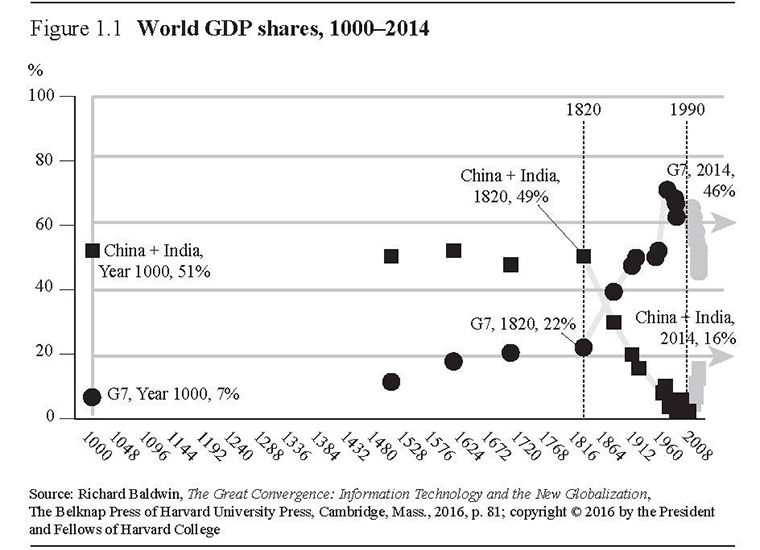
Over the last 25 years, the relative growth rates of the world’s major economies have changed dramatically. Six developing countries in particular – China, South Korea, India, Poland, Indonesia, and Thailand – have grown extremely fast during this period. The rich G7 countries, on the other hand, have experienced slowing rates of labour productivity growth, and their combined share of world GDP has fallen from two-thirds to one-half.

Neoclassical growth theory, which has dominated economic thinking over this period, has not been able to explain this reversal of fortunes. For anyone who has watched South Korean and Chinese firms triumph in one world market after another, it is difficult to believe that Western countries will be able to compete more effectively in the future simply by making their own markets more efficient.
If the developed world is to boost its competitiveness, we in the West need to embrace some new economic thinking. That means gaining a better understanding of the growth process, and using this knowledge to develop policies that can help accelerate it. Moreover, we should not think that we can acquire this knowledge by building ever more complex and unrealistic mathematical models.
A good place to start is with the measurement of national wealth, and the fact that a country’s GDP per capita is simply the sum of the value added per capita of all its economic organizations, mainly firms.
We then need to ask how firms increase their value added per capita. In the observable world, rather than the world of perfect competition embraced by neoclassical economists, companies can do this in two ways. They can increase their production efficiency, as Henry Ford did when he started using an assembly line to manufacture cars, or increase the competitive advantage of their products, as Steve Jobs did when he developed Apple’s iPhone.
Both Ford and Jobs increased the competitiveness of their firms by innovating. Countries like China and Singapore have done the same, helped along by lessons from more advanced economies. Both have declared themselves to be innovation nations, and have put innovation at the heart of government policy.
Western countries therefore need to understand three things in particular. First, they must increase their rates of innovation in order to compete better against fast-growing emerging economies. That will require them to develop policies that strengthen national systems of innovation, education, and training, and improve the governance and financing of their firms. Municipal- and regional-level policies should support these goals.
Second, the West needs to understand that there is a global ladder of economic development, the rungs of which represent increasing levels of organizational and technological complexity, and value added per capita. It is difficult for any firm to gain a competitive advantage in activities such as manufacturing cheap clothes and assembling electronic components, resulting in low value added per capita, and thus low wages and salaries. By contrast, companies in industries such as aerospace and pharmaceuticals can build up significant competitive advantages, leading to high value added per capita and consequently high wages and salaries.
Developing countries are rapidly moving up the ladder, and are increasingly competing directly with developed economies. The latter therefore must innovate rapidly both to increase the value added of their current industries, and to move into new high-value-added sectors.
Finally, Western firms and policymakers should understand that their countries’ competition with China and other rising economic powers is now a “race to the top,” not a “race to the bottom” in which cheap labor and a “favorable” exchange rate are seen as the best ways to achieve and maintain competitiveness.
If developed countries can move further up the ladder of economic development by innovating and creating new high-value-added products and services while ceding lower value-added areas of activity to developing countries, then all can increase their national standards of living at the same time. If the pie is larger, everyone can have a larger slice.
To be sure, macroeconomic stability and efficient markets, which lie at the heart of neoclassical economic thinking, remain essential conditions for growth. But they do not drive it. If we in the West want to compete effectively against China and other fast-growing Asian countries, we need to understand that innovation is the engine of growth, and governments need to make it central to their economic policies.
David Sainsbury, a member of the British House of Lords, was Minister of Science and Innovation under Tony Blair (from 1998 to 2006), and is the author of Progressive Capitalism: How to Achieve Economic Growth, Liberty, and Social Justice. Copyright: Project Syndicate, 2019, and published here with permission.
8 Comments
This is a big conversation which the article touches on in its overview'ish way, but the answer is correct... Innovation is the way to stay on top of the ladder. The problem with the west today is that so many people are missing out on this party - inequality they call it. These people struggle to learn (anything) therefore struggle to earn very much and seem to be the largest group represented in the high risk single parent market & the taxpayer sponsored breeding programmes. They are also quite fortunate to be part of the welfare systems of the west, but they have no idea at all about that.
What I'm saying is that the west is still doing very well on a global basis, but they are also carrying the booming bottom half of our cultures, who add very little value to themselves or their countries & become a drag, not only on themselves, but on everyone who carries them.
If Darwinism is the survival of the fittest, then today's western cultures must be anti-Darwinism, as they encourage & spend a fortune on the survival of the weakest.
China has cleverly thwarted down any Western innovation, have a look around worldwide. It's easy to choke the west innovation. Make it harder for innovation/creativity to thrive for those western world youth, grab the land.. make it harder to get one, supply more & more anything addiction related activity, make them dependent on it.. BUT don't give a chance for creative/innovation to grow.. now, observe the landscape.
Is this just more of Harold Wilson 'white heat of technology' speech from 1963?
Our govt knows better; we can lead the world with 2% GDP growth so long as we have a matching 2% population growth of chefs, bakers, tourist guides and menial jobs too badly paid for Kiwis to accept. For example employ 3rd world bus drivers who are less likely to strike, happier to accept split shifts and their wage growth is below average. The OECD rates our school leavers as highly skilled; pity the innovative emigrate. NZ a great country to retire to.
Correct Lapun, but even that retirement is on the ever decreasing quality pathway, cost to sustain it.. even gossiping of increasing Super age, is a dreadful to mention, interest? ha ha..our population demographics getting more & more looks like Japan.. bottom few to support bigger/heavier top. No wonder most of NZ skilled,innovative,creative young generations opt out.

We welcome your comments below. If you are not already registered, please register to comment.
Remember we welcome robust, respectful and insightful debate. We don't welcome abusive or defamatory comments and will de-register those repeatedly making such comments. Our current comment policy is here.